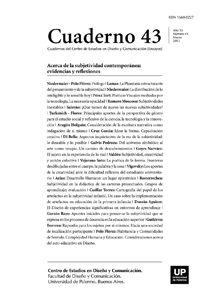La Phantasía estructurante del pensamiento y de la subjetividad
Abstract
The identification process is rooted in subjective thought. When talking about subjectivity we clearly refer to thoughts and to the subject that professes them. This paper begins by considering the need to know. What it means thinking? What role language plays in forming our opinion?, Which is the root of the story producer thinking?, How does the imagination get involved in the formation of subjectivity? The text discusses the notions of thought and language and its relation to the Phantasia in the process of formation of subjectivity, and provides a definition of the subject based on the understanding of being which explains the sense of reality that defines our sameness.
References
Aristóteles. (2010). De Anima- Acerca del Alma. Traducción de Marcelo D. Borei. Buenos Aires: Colihue.
(2003). Metafísica. Tradución de Alex Shantytow y Carlos A. Samonta. Buenos Aires: Libertador.
Coccia, E. (2007). Filosofía de la Imaginación: Averroes y el Averroísmo. Buenos Aires: Adriana Hidalgo.
Ferrater Mora, J. (1981). Diccionario de Filosofía. Barcelona: Alianza.
Heidegger, M. (2007). La experiencia de pensar, seguido de Hebel, el amigo de la casa. Córdoba: Del Copista.
Joseph, I. (1988). El transeúnte y el espacio urbano. Barcelona: Gedisa.
Lyotard, J. L. (1991). La condición Posmoderna. Traducción de Mariano A. Rato. Buenos Aires: Iberoamericana.
Pérgolis, J.C. (2003). La Plata Express, Arquitectura, Literatura y Ciudad. Buenos Aires: Nobuko.
Sartre, J. P. (1964). Lo Imaginario. Buenos Aires: Losada 4ta edición.
Los autores/as que publiquen en esta revista ceden los derechos de autor y de publicación a "Cuadernos del Centro de Estudios de Diseño y Comunicación", Aceptando el registro de su trabajo bajo una licencia de atribución de Creative Commons, que permite a terceros utilizar lo publicado siempre que de el crédito pertinente a los autores y a esta revista.


